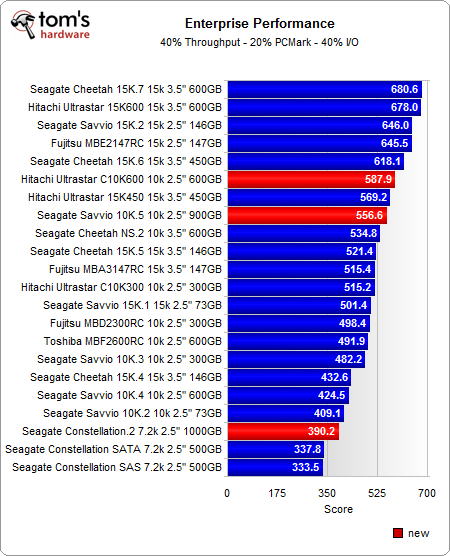Three 2.5" SAS Drives: Enterprise Data Giants, Compared
Currently, 2.5" enterprise drives are leaving their 3.5” competitors behind. They're faster, more flexible, and now they offer comparable capacities (we're up to 1 TB now). In this piece, it's Hitachi versus Seagate battling for high-density supremacy.
Conclusion
A combination of the highest data transfer rates, the best I/O performance, and the lowest power consumption helps Hitachi's Ultrastar C10K600 edge out its competitors for top honors. Because of its performance, the drive can easily keep up with products that operate at 15 000 RPM. It is the fastest 10 000 RPM drive we have tested to date.
Seagate's Savvio 10K.5 is either just behind or on par with the Hitachi Ultrastar C10K600 in nearly all our test disciplines. It is really only in terms of I/O performance that the victor sets itself apart, clearly defeating the two Seagate devices (especially the Constellation.2).
If we ignore I/O performance, the Hitachi Ultrastar C10K600 and Seagate Savvio 10K.5 have even more in common than their high performance. With each drive featuring a MTBF of 2 million hours, they both clearly prioritize reliability.
On the other hand, Hitachi's Ultrastar C10K600 clearly loses the capacity contest because its maximum capacity of 600 GB is far below the Savvio 10K.5's 900 GB. Administrators satisfied with adequate (but not outstanding) I/O performance and roomier capacities should choose the Seagate Savvio 10K.5.
While it's by no means a bad drive, Seagate's Constellaion.2 suffers in a comparison to its competitors. It is a solid enterprise drive, but it cannot match the data throughput, access time, I/O performance, or low power consumption of either its in-house rival or the Hitachi drive. With a MTBF of 1.4 million hours, the Constellation.2 also doesn't have the reliability chops of the other drives. Its single trump card is a maximum 1000 GB capacity, which is unsurpassed to date.
Get Tom's Hardware's best news and in-depth reviews, straight to your inbox.
-
compton Toms with some more review niceness. Thanks for another interesting article. I don't think mechanical storage is going anywhere soon. For better and worse we'll still have it around for a long, long time to come. Even when SSDs hit that magical speed/capacity/cost point to be ubiquitous for mainstream consumers, enterprises will still need HDDs as part of their storage needs. HDDs are at least a known quantity that are still getting better.Reply -
bit_user 3rd paragraph: "have to be taken into considered". You also didn't mention capacity and cost/GB, where mechanical disks still reign supreme.Reply
Also, why not benchmark a 3.5" disk, but only use the outer portion. If both that and a 2.5" have the same density and rotational velocity, then the 3.5" should win due to higher I/O speeds resulting from higher linear velocity.
